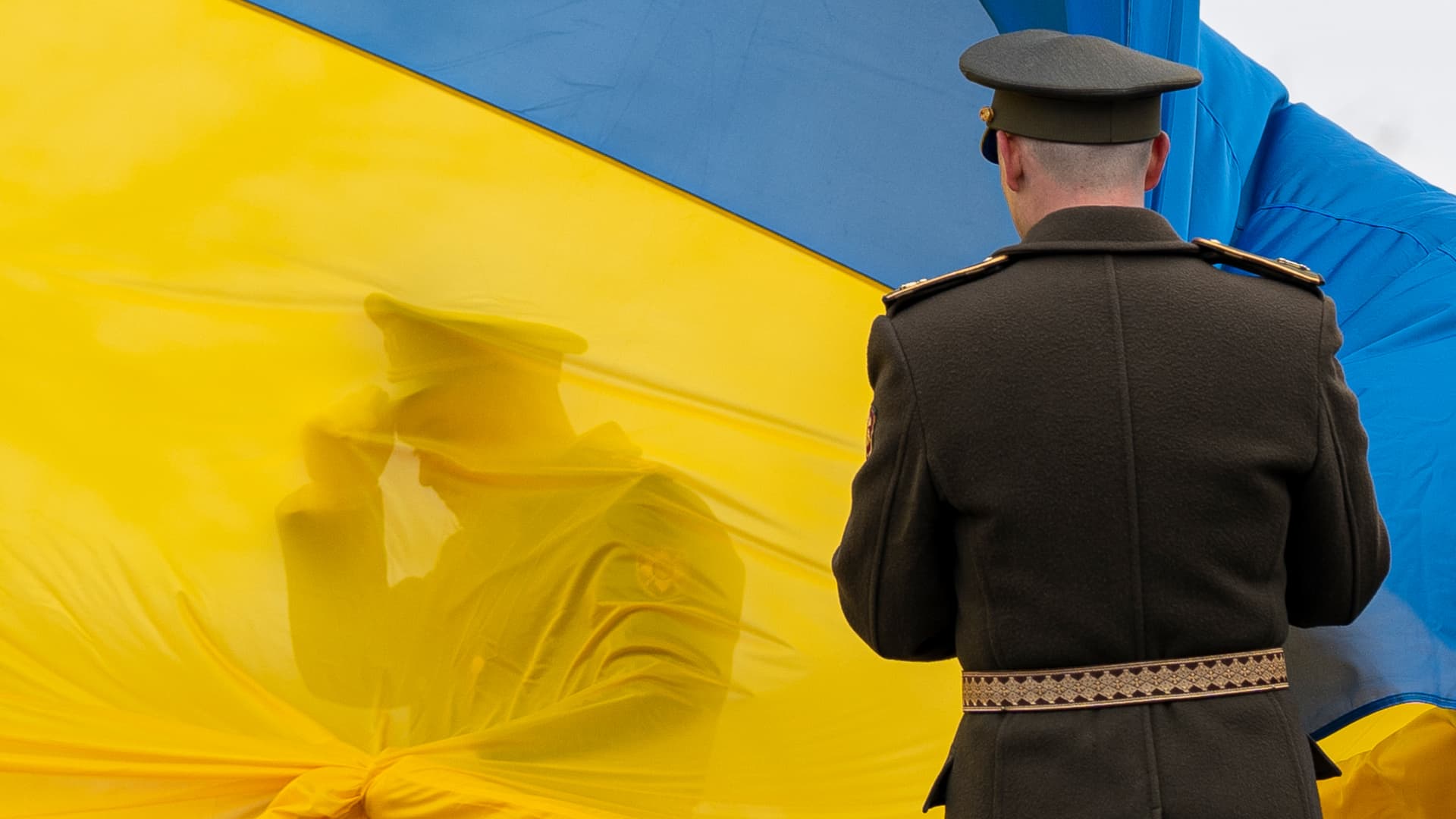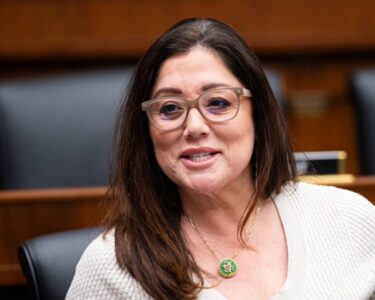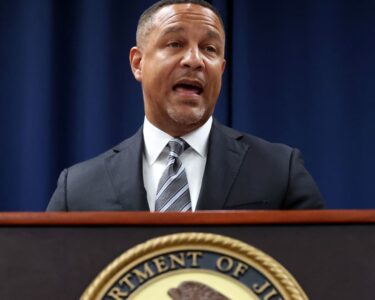This was CNBC’s live blog tracking developments on the war in Ukraine. See here for the latest updates.
There were more signs of vulnerability in Ukraine’s relationships with its international partners over the weekend, following a key vote in neighboring Slovakia and the United States’ halt on funding for Kyiv.
Ukraine was trying to be optimistic in the face of a potential U.S. government shutdown and 45-day pause on additional funding for Kyiv that was part of a stopgap bill agreed at the weekend.
Meanwhile, a pro-Russian, populist party has won the most votes in a parliamentary election in Slovakia, casting into doubt the country’s future support for ongoing military aid for Ukraine.
Slovakia’s Robert Fico — who served as the country’s prime minister between 2006 and 2010 and again from 2012 to 2018 — and his Smer-SD party beat his progressive rival in the vote Saturday, having campaigned on a manifesto to end continuing support for Slovakia’s neighbor Ukraine.
He also urged Russia and Ukraine to compromise to find a peace deal.
Given that Fico’s party did not win an outright majority, however, it will need to form a coalition to gain a mandate to govern. The parties that form the coalition with Smer could determine whether Ukraine can count on Slovakia’s continuing support.
Two people were killed and 10 injured in the latest shelling of Ukraine’s Kherson region, according to Ukrainian officials.
Overnight and morning attacks hit shops, schools, a kindergarten and hospitals in the Beryslav district, Oleksandr Prokudin wrote on Telegram, as translated by Google Translate.
One of the people killed was a policeman who had tried to rescue a civilian and later died on the hospital operating table, Prokudin said.
CNBC could not independently verify the reports.
— Hannah Ward-Glenton
Ukrainian President Volodymyr Zelenskyy said Europe’s common victory “explicitly depends” on cooperation.
“I am confident that Ukraine and the entire free world can prevail in this confrontation. But our victory explicitly depends on our cooperation,” Zelenskyy said in an EU-Ukraine Foreign Ministers’ meeting published on the Ukrainian presidency website.
“The more powerful and principled steps we take together, the sooner this war will end. End fairly. With the restoration of our territorial integrity and a reliable guarantee of peace for the whole of Europe.”
The speech comes as war fatigue appears to be growing among some of Ukraine’s allies, with a pause in U.S. funding for Ukraine and a pro-Russian candidate having won Slovakia’s general election over the weekend.
— Hannah Ward-Glenton
Volunteers with the organization ‘Postup’ use drones to search for mines near the town of Derhachi, Kharkiv region, on October 1, 2023.
-Sergey Bobok | AFP | Getty Images
Russia claimed Monday that war fatigue is spreading among Ukraine’s allies, stating that this was exemplified by the pause in U.S. funding for Ukraine and the triumph of a pro-Russian candidate in Slovakia’s weekend election.
“As we said earlier many times, according to our estimates, people in many countries, including the U.S., will be growing tired of this conflict, tired of this totally absurd sponsoring the Kyiv regime. This tiredness will lead to the political establishment splitting,” Dmitry Peskov, the Kremlin’s press secretary, told reporters Monday.
Nonetheless, Peskov said the U.S.’ plan to temporarily halt funding for Ukraine for 45 days, as part of a stopgap funding bill passed by Congress at the weekend, did not mean U.S. support for Kyiv was over.
“This is a temporary occurrence, evidently. The U.S. will continue their involvement into this conflict, almost a direct involvement,” he said.
— Holly Ellyatt
German exports of military equipment to Ukraine grew more than fourfold so far this year, making Kyiv the main recipient of German arms, the economy ministry said on Monday.
Ukraine accounted for 3.3 billion euros ($3.48 billion) out of Germany’s total value of authorised military exports of 8.76 billion euros in the first nine months of the year.
By contrast, for the same period last year, 775 million euros’ worth of equipment had been approved for Ukraine.
Germany has repeatedly promised to support Ukraine for as long as necessary following the Russian invasion in February 2022, which prompted German Chancellor Olaf Scholz to speak of a turning point in Germany’s attitude towards defense.
Hungary, which has long said it would increase its military spending, was the second-largest recipient at 1.03 billion euros, followed by the United States with 467 million euros.
— Reuters
Russia said it is watching political developments in Slovakia after the pro-Russian populist, and former prime minister, Robert Fico won a parliamentary election at the weekend.
When campaigning, Fico promised to halt military support for Ukraine and called on Kyiv and Moscow to reach a compromise to end the war.
On Monday, Kremlin spokesman Dmitry Peskov said it was ridiculous that European politicians like Fico were labelled pro-Russian.
“Now anyone who thinks about the sovereignty and independence of their country are getting called pro-Russian. We would surely like to see experienced and cool-headed leaders in Slovakia,” he said, in comments translated by NBC.
Fico and his Smer party still needs to form a coalition in order to govern so their future coalition partner could determine which direction the country goes in when it comes to support for Kyiv.
— Holly Ellyatt
Russia’s Deputy Foreign Minister Sergei Ryabkov said Monday that the stopgap funding bill passed by the U.S Congress over the weekend, which halts funding for Ukraine for 45 days, would change nothing in terms of poor Russia-U.S. relations.
“They will continue to support. We don’t need to think that this will change anything, this is just a show for the public, this is chatter,” Ryabkov said in comments published by the Tass news agency.
“Fundamentally, Washington’s focus on supporting the client in Kiev [Russia uses a different spelling for Ukraine’s capital Kyiv] does not change,” he added, in comments translated by Google.
Ryabkov said Moscow sees no prospects for improving relations with the Americans: “Until they come to their senses and begin to change their policy in this direction, I don’t think there will be any prospects” of an improvement.
— Holly Ellyatt
Ukraine’s top diplomat said on Monday Washington’s support for Kyiv was not weakening, and played down the significance of a stopgap funding bill passed by U.S. Congress that omitted aid to Ukraine.
U.S. and other Western military assistance has been vital for Ukraine to fight back against the full-scale invasion launched by Russia in February 2022.
Foreign Minister Dmytro Kuleba said Kyiv was in talks with Republicans and Democrats in the U.S. Congress, and that the drama around the stopgap bill that averted a government shutdown on Saturday was an “incident” rather than something systemic.
“We don’t feel that the U.S support has been shattered… because the United States understands that what is at stake in Ukraine is much bigger than just Ukraine,” he told reporters as he greeted European Union foreign policy chief Josep Borrell before a meeting of EU foreign ministers in Kyiv.
“It’s about the stability and predictability of the world and therefore I believe we will be able to find necessary solutions.”
Kuleba said the question was whether what happened in the U.S. Congress at the weekend was “an incident or a system”.
“I think it was an incident,” he said. “We have a very in-depth discussion with both parts of the Congress – Republicans and Democrats. And against the background of the potential shutdown, the decision was taken as it was.
“But we are now working with both sides of the Congress to make sure that it does not (get) repeat(ed) again under any circumstances,” he said.
— Reuters
Russia is struggling to deal with “concurrent threats” on its southern front in Ukraine and is using naval air power to project force over the northwestern Black Sea, Britain’s Ministry of Defense said in an intelligence update Monday.
The ministry noted on X, formerly known as Twitter, that “in recent weeks, the Naval Aviation component of Russia’s Black Sea Fleet has assumed a particularly important role in the Fleet’s operations as it struggles to deal with concurrent threats on the southern flank of the Ukraine war.”
“Naval Aviation is emphasising maritime air patrol operations, highly likely with a primary mission of the early identification of uncrewed surface vessels,” the ministry said.
It said a key Russian asset in these operations is the Be-12 MAIL amphibious aircraft, flying out of bases in Russian-occupied Crimea, while Su-24 Fencer and Flanker combat jets have been carrying out maritime strike operations, including one recent airstrike on the strategically located Snake Island.
With more Black Sea Fleet activities likely relocating to Novorossiysk in the face of threats to Sevastopol, the ministry said “Russia is attempting to use naval air power to project force over the north-western Black Sea.”
— Holly Ellyatt
Ukraine is trying to be optimistic in the face of a potential U.S. government shutdown and pause on additional funding for Kyiv.
Congress passed a stopgap bill on Saturday that extended government funding for 45 days in order to avoid a dramatic government shutdown. However, the bill, which will be in place until Nov. 17, did not include aid for Kyiv.
Ukraine already appears to be in an increasingly vulnerable condition with potential political shifts in Europe. And next year’s U.S. election could see sentiment shift around continued military, financial and humanitarian assistance for Kyiv.
Ukraine tried to put on a brave face on the funding uncertainty, with Oleg Nikolenko, spokesperson of Ukraine’s Foreign Ministry, saying in a post on Facebook Sunday that “the situation with the temporary U.S. budget will not stop the aid to Ukraine that was announced earlier.”
“Instead, the potential “shutdown” of the American government could have a negative impact on the implementation of current programs for Ukraine,” he said.
“Currently, the Ukrainian authorities are actively working with American partners so that the new U.S. budget decision, which will be worked out within the next 45 days, includes new funds for assistance to Ukraine,” he added.
Nikolenko concluded his remarks by saying: “Let’s not forget that internal political discussions related to the American political process are ongoing in the USA. Support for Ukraine remains unwaveringly strong both in the U.S. Administration and in both parties and houses of the U.S. Congress, and most importantly, among the American people.”
U.S. President Joe Biden warned Sunday there is “not much time” to keep funds flowing to Ukraine, and urged Congress to “stop the games, get to work.”
Speaking in the White House, Biden said he was “sick and tired of the brinkmanship” and said his message on future aid for Ukraine was: “We’re going to get it done.”
— Holly Ellyatt
A pro-Russian, populist party won the most votes in a parliamentary election in Slovakia over the weekend, casting into the doubt the country’s future support for ongoing military aid for Ukraine.
Robert Fico — who served as the country’s prime minister between 2006 and 2010 and again from 2012 to 2018 — and his Smer-SD party beat his progressive rival in the vote Saturday, having campaigned on a manifesto to end continuing support for Slovakia’s neighbor Ukraine. He also urged Russia and Ukraine to compromise to find a peace deal.
The Smer party won almost 23% of the vote, results from the Slovak statistics office showed Monday, but did not win an outright majority, meaning the party will need to form a coalition to govern.
The pro-Western Progressive Slovakia party was second in the vote, with almost 18% of votes cast. The left-wing Hlas party, led by Fico’s former political colleague Peter Pellegrini came in third with almost 15% of the vote.
The party that takes the lead in forming a coalition, and the parties that coalesce around it, will determine the direction Slovakia takes in the coming years, Sili Tian, Europe analyst at the Economist Intelligence Unit, said Friday.
“The choice is between a lurch to the right if far-right parties join up with Smer or a more centrist, pro-EU approach if Hlas and Progressive Slovakia join forces,” Tian said.
Coalition talks cannot take long as it’s likely that Fico will now have 30 days to present a Cabinet and its governing program for approval in Parliament by an absolute majority. If unsuccessful, the process can be repeated multiple times, according to Andrius Tursa, Central and Eastern Europe advisor at risk consultancy Teneo.
In a note Sunday, he said that “following a clear victory in the 30 September parliamentary elections, the populist SMER-SD party holds the best chance of forming the next government.”
“On the domestic front, the return of a SMER-SD-led government would likely bring setbacks in tackling corruption, pose a risk of democratic erosion, and heighten risks to foreign investors” while on the foreign policy front, “Bratislava would take a Euroskeptic and pro-Russian turn, which would strain relations with its key Western partners.”
— Holly Ellyatt






